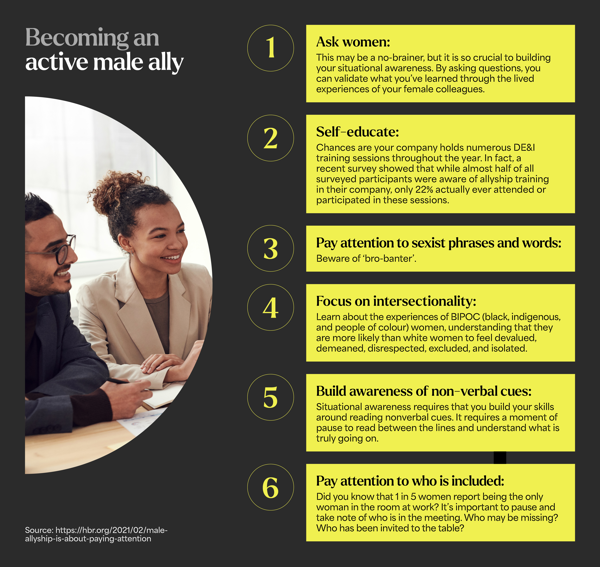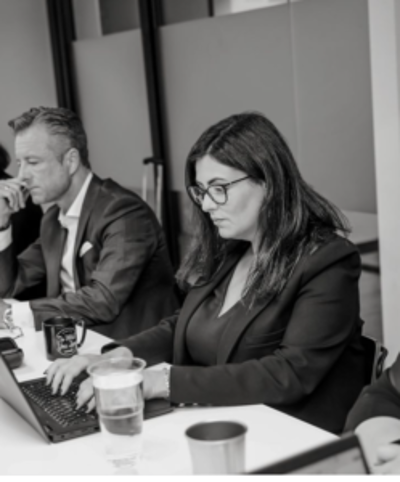On 8th March it will be International Women’s Day (IWD) and this year the campaign theme is #EmbraceEquity, which is about creating a fair and equitable world, for all. Progress has been made since the first IWD in 1911 and the adoption of IWD by the United Nations in 1975. Yet, there is still much to be done which is why allyship is vital. It takes active participation from men to embrace equality, and more importantly equity. Interestingly, a recent poll of C-Suite leaders shows there is a significant gap between men who believe they are active allies and their female colleagues agreeing. In fact, 77% of male C-Suite leaders surveyed felt they were active allies, but only 38% of their female colleagues agreed [1]. So, what needs to be done to ensure that we are all taking pause, paying attention and then acting?
At Laurence Simons (LS), we had Chris Watson as a guest on our first Summing Up episode of 2023. Chris is a seasoned lawyer, with 30 years’ experience in both France and the UK in communications, technology and competition practice areas. He is currently a Partner at CMS and recognised in The Legal 500 Hall of Fame as one of the elite leading lawyers for telecommunications. During our conversation, we touched on the topic of Diversity, Equity & Inclusion (DE&I), and Chris had this to say:
“At the very minimum, there is an awareness of it (diversity, equity and inclusion). And even those who don’t completely get it are all aware that they ought to. I think there’s still a lot of work that needs to be done everyday by everybody.”
This rings true when compared with the poll results above - many men feel they are active allies but their female colleagues perceive it differently. As Chris notes, even those who do not completely understand DE&I are aware that they ought to. Whilst many support gender inclusion and equity, many lack the situational awareness to see gender discrimination and harassment in their day-to-day work [2].
An area to consider when looking at this discrepancy between male and female perception is age. In a study conducted between Thomson Reuters and Penn Law, it found the following responses from men within the legal sector from different generations:
“For 50+ men, Pendleton states: “There is a large backlash and fundamental misunderstanding of how women’s rights to not be harassed do not equal a lessening of men’s rights. For men age 30-49, the #MeToo movement has created feelings of fear and trepidation on how to properly interact with women in the new era. For men under 30, Pendleton notes that “men of this generation have an easier time grappling with and engaging with protecting women and showing them the respect they deserve.”
Natalie Runyon, Thomson Reuters
There is some good news for the future: by 2031, 31% of the workforce will be made up of Gen Z employees [3], meaning the emerging Millennial and Gen Z mindsets will become more current and considered within the workplace. Although not necessarily in positions of power yet they will be able to influence and move the debate forward from taking pause, to paying attention and ultimately towards action. In our daily work at LS, we see all our clients looking at their culture and work practices to ensure that they can retain this talent. Gen Zers want purpose and will be loyal to companies who embody this, alongside lived DE&I policies.
However, today’s reality is that most Chiefs and leaders in organisations are in the other two age categories. The hands on the levers of power are still – with notable exceptions – mostly older, white men. How can these leaders become allies? Create a situational awareness learning plan and then, by drawing on the (re)learned awareness of the importance of this topic, act on it. Boldy. This is a call to action to many brilliant, hesitant, uninformed, curious, uncertain, brave older (and younger – we won’t be ageist!) men. We need your help and support to #EmbraceEquity and become our allies.
Let’s get practical about what you can do with the help of Dr. Brad Johnson and Dr. David Smith, Here’s how you can build your situational awareness and become an active ally:

Since the pandemic, according to McKinsey 2.3 million women have left the workforce in the U.S [4]. This is also reflected in the UK, where 35% of working mothers lost hours or their jobs due to the lack of childcare during the pandemic [5]. Childcare is not a female-only domain. We know that much more work needs to be done for parents and parenthood to allow all families to thrive. There is work to be done here by allies supporting and promoting policies to allow women to stay in work.
#EmbraceEquity: We need men to be a part of the conversation as they are part of the solution. The time to learn is now. Develop your situational awareness so that, as Chris Watson said, “…when the call goes around for support - I am there for support”.
References:
[1] https://hbr.org/2022/10/research-men-are-worse-allies-than-they-think
[2] https://hbr.org/2021/02/male-allyship-is-about-paying-attention
[4] https://greatergood.berkeley.edu/article/item/nine_tips_for_being_a_male_ally_at_work
[5] https://commonslibrary.parliament.uk/how-has-the-coronavirus-pandemic-affected-women-in-work/


